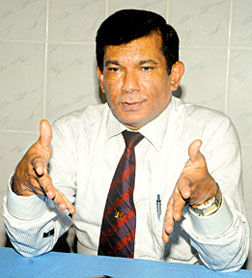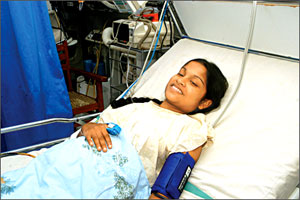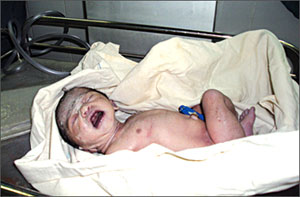Miraculous 'ectopic' baby born
by Thulasi MUTTULINGAM
|
According to
Dr. Tilak Dissanayake, it was a good thing that her pregnancy
was correctly diagnosed, even though a bit late at 33 weeks, as
they could then take the appropriate steps to deliver the baby
correctly |
 |
The Castle Street Hospital for women might have the first baby in Sri
Lanka, who successfully grew to full term outside her mother's womb and
was delivered alive and well.
"In Castle Street Hospital itself, this is the second recorded such
pregnancy, there was another case in 1981 which was not successful" said
the Senior Registrar of the hospital, Dr. Kanishka Samaranayake. "There
might have been two cases in the areas of Anuradhapura and Polonnaruwa
which might have led to live births but we do not have the details" he
added.
According to consultant obstetrician and gynaecologist at the
hospital, Dr. Tilak Dissanayake, who delivered the baby, this is a very
rare form of pregnancy. "Usually embryos grow in the uterus (womb) of
women but here the embryo had transplanted itself in the abdominal
cavity and the pregnancy had progressed up to 36 weeks" said the doctor.
"The pregnancy was believed to be and treated as normal in the
initial stages. It was at the Moneragala General Hospital that the
visiting obstetrician gynaecologist, Dr. Prasad Wickremasinghe,
identified the baby as growing outside the womb. He is one of my
students and so he called me up to discuss the case and we made
arrangements to transfer the patient to the Castle Street Hospital."
The patient was transferred to Castle Street Hospital only on June 23
and the baby was delivered on June 29. According to Dr. Dissanayake, it
was a good thing that her pregnancy was correctly diagnosed, even though
a bit late at 33 weeks, as they could then take the appropriate steps to
deliver the baby correctly.
 He termed what could have happened if the condition had not been
diagnosed as a 'disaster.' He termed what could have happened if the condition had not been
diagnosed as a 'disaster.'
Abdominal pregnancies as they are generally termed are extremely rare
and it is even more rare for them to end in live births. They are a rare
form of a condition known as ectopic pregnancies (pregnancies outside
the uterine cavity).
Most ectopic pregnancies are in the fallopian tubes (the two tubes on
either side of the womb connecting it to the ovaries) but a few are
pushed out of the fallopian tubes and end up in other places including
the abdomen.
For such a baby to come to term alive and well is very rare. Even if
the baby manages to get the required nutrition and mature, the mother
has no way of delivering the baby naturally, in which case the baby dies
in the abdomen. Even then, if it is too big to be reabsorbed into the
mother's body, it still cannot be ejected.
What happens then is that it calcifies inside the mothers body (it
doesn't decompose as one would think is natural - if that happened, the
mother would come to harm) and becomes what is known of as a 'stone
baby', a lithopedion.
There have been recorded cases of lithopedions being extracted
decades after they formed from women who didn't even know they had them.
The most well known case to make headlines recently was that of Huang
Yijun, a 92 year old woman from China who was relieved of a stone baby
60 years after it died in 1948.
 She apparently knew that she had had a baby and that it had died but
doctors charged her 100 pounds for surgery to remove it and so she did
nothing about it. She apparently knew that she had had a baby and that it had died but
doctors charged her 100 pounds for surgery to remove it and so she did
nothing about it.
Fortunately, 21 year old H.M.D. Chathurika of Moneragala has a much
happier story. This is her first baby and she apparently noticed nothing
wrong during the whole term. She is still in the hospital, under close
observation but says she feels fine.
She has had a laparotomy to deliver her baby (incision on her abdomen
to get to her abdominal cavity. If the baby was delivered by caesarian
section, the incision would have been on the lower abdomen to get to her
uterus).
Her placenta (organ which forms to provide special nutrition to the
baby as well as to facilitate gas exchange and waste elimination) has
been left inside her intact as its surgical removal might cause heavy
bleeding. Ideally, after pregnancy, the placenta has to come out too but
there were some complications here that make it impossible to remove it.
"We have left it to get reabsorbed into her body. Nature will do the
rest but we are giving her some drugs to get it dissolved faster," said
Dr. Dissanayake.
He added that the baby and mother were fine at the time of delivery
and were continuing to do well. |

